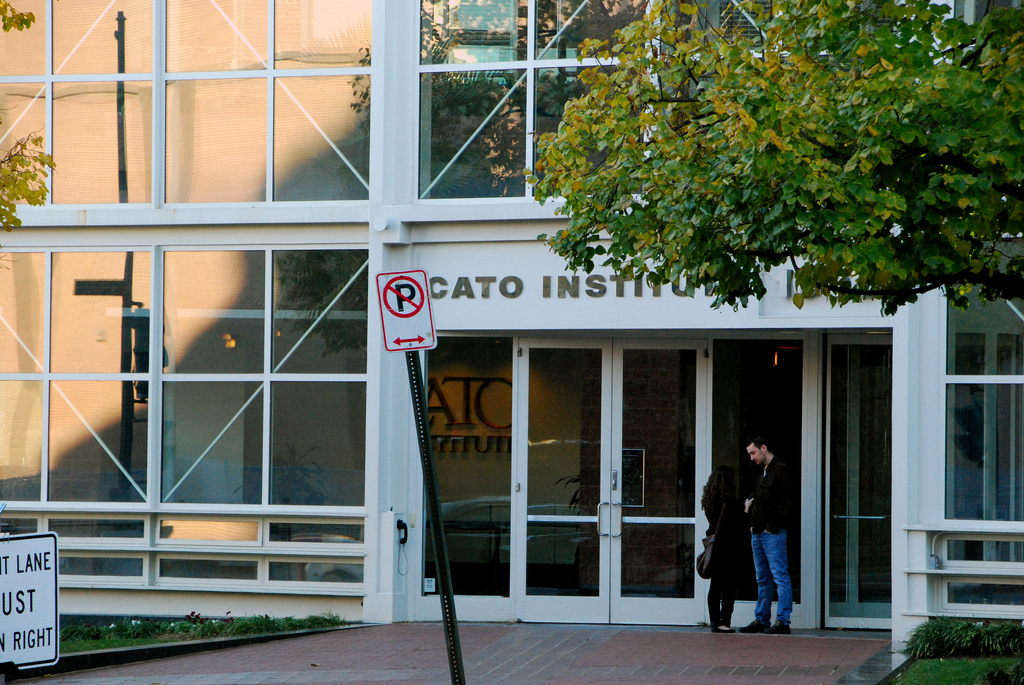Two of Prime Minister Theresa May’s special advisers met with a libertarian US think tank founded by climate science denial funder Charles Koch last winter, but Number 10 Downing Street will not say why.
The failure to disclose the details of the meetings with the Cato Institute raises questions about whether there is a loophole regarding disclosures under the Freedom of Information Act.
DeSmog UK can reveal that on February 16 special advisors Chris Brannigan and Jimmy McLoughlin attended a lunch hosted at the Cato Institute in Washington D.C. According to the think tank, trade issues were discussed.
The Cato Institute was co-founded in 1977 by Charles Koch, one of the billionaire brothers who own one of the United States’ largest privately-held companies, Koch Industries, which began as an oil refining company. Both the Koch brothers and Cato are known for supporting and spreading climate science denial.
No Information
The lunch – requested by UK special advisor McLoughlin – was organised by Cato’s Ryan Bourne, a Chair in public understanding of economics at the think tank. Prior to working at the Cato Institute, Bourne was the head of public policy at the Institute of Economic Affairs and the head of economic research at the Centre for Policy Studies – two neoliberal think tanks located in the heart of Westminster.
Nothing more, however, is known about the lunch meeting between Cato and Theresa May’s special advisers. Following a lengthy process of multiple Freedom of Information requests the Prime Minister’s Office claims to hold no record of the purpose of the meeting or what was discussed over lunch.
The meeting is the latest example of UK government officials meeting with libertarian think tanks in the US which have a history of promoting climate science denial and working to undermine environmental regulations. DeSmog UK has previously documented the increasingly intertwined dealings between Brexiteers and climate science deniers across the pond.
The only information DeSmog UK was able to obtain was a brief email exchange between Bourne and McLoughlin setting up the lunch. On February 9 2017, McLoughlin wrote to Bourne ahead of his trip to the States.
“Could we grab lunch on Thursday?”, wrote McLoughlin. Bourne responded the next day: “Hi Jimmy – we are going to put on a small, informal lunch up near my office at Cato for 8 people. Is that ok? Will be very informal.”
“Sounds great,” replied Mcloughlin. “Looking forward to it.”
Check out DeSmog UK‘s new disinformation database for more
The lunch meeting was originally disclosed on the government’s transparency logs at the end of June. These disclosure logs show details of government officials’ meetings and hospitality received.
A Cato press officer confirmed that the lunch was organised for the UK government advisors “at their request” adding “I understand trade policy was the main focus of discussion”.
‘Informal Meeting’
Information disclosed in the FOI requests confirm the meeting took place at the Cato offices. The Prime Minister’s Office also confirmed that the meeting was an “informal lunch”.
However, it’s unclear what makes a meeting “informal” versus “formal” and whether there are any rules or guidance regarding what records must be kept of these meetings, or if this is different for informal and formal meetings.
DeSmog UK sought further clarification on this from the Prime Minister’s Office and whether any guidance or definition is used by the department or government regarding what constitutes an “informal meeting”, including lunch meetings such as the one that took place at Cato.
The Prime Minister’s Office replied stating that “following a search of our paper and electronic records, I have established that the information you requested is not held by the Cabinet Office.”
According to the Information Commissioner’s Office: “The Freedom of Information Act (FOIA) does not define an “informal” meeting, and the ICO doesn’t have any general guidance on this point, beyond the fact that the FOIA applies to information held by public authorities.”
As the ICO told DeSmog UK via email: “If no information has been generated and recorded during a meeting or related to a subject, then there may be nothing held by the PA [public authority] related to that meeting or subject and so nothing for them to provide in response to a request.”
So it appears there is no hard or fast rule about what makes a certain meeting “informal” or not between government officials and individuals from think tanks, companies, the media or any other organisation. And if no records are made in relation to a meeting then there is no information to disclose to the public.
DeSmog UK contacted the Cabinet Office for comment ,however the department failed to reply in time for publication.
For more information on key actors lobbying against action on climate change, take a look at DeSmog UK’s newly launched Climate Disinformation Database, and our new Web of Disinformation map.
Photo: Beyond DC via Flickr | CC2.0
Subscribe to our newsletter
Stay up to date with DeSmog news and alerts






